:max_bytes(150000):strip_icc():format(webp)/airpodbatterylevelonandroid-15c1db7e9fac43248d130a42540c12a6.jpg)
New Vital Details About Accessing YouTubes Sound Library

Vital Details About Accessing YouTube’s Sound Library
Versatile Video Editor - Wondershare Filmora
An easy yet powerful editor
Numerous effects to choose from
Detailed tutorials provided by the official channel
Sound and music are the whole and soul of a video. They help engage the audience, generate an emotional response, indicate mood, and much more. However, there’s one catch. As a video content creator, you must be already aware that not every sound effect or music you want to add to your video is available for free or available at all. This sometimes can be a real setback for a content creator. But what if I tell you there is a way around it? That you can get the music you want without paying extra bucks for it. Yes, a platform called YouTube Sound Library can resolve your issue. And help you find the music that you are longing for. Want to know how? Then read along.
In this article
01 [Question 1: What is YouTube Sound library?](#Part 1)
02 [Question 2: How to Find YouTube Sound Library?](#Part 2)
03 [Question 3: Is YouTube Sound Library Free?](#Part 3)
04 [Question 4: How Can I Use YouTube Sound Library?](#Part 4)
05 [Question 5: How to Add Music from Sound Library to My Video?](#Part 5)
Part 1 What is YouTube Sound library?
Content creators are always treading the tightrope when it comes to budget. They are always watching out for a way to make their work cost-efficient by cutting costs wherever possible.
Sounds and music are some fields where you cannot afford to be cost-effective, as it is bound to hamper the quality of your final product. But buying the rights of music or sound can also have adverse effects on your purse. This is where YouTube Sound Library can save the day for you.
YouTube Sound Library is a segment of YouTube Studio dedicated to presenting content creators like you with royalty-free music from different genres, moods, and artists around the globe.
Part 2 How to Find YouTube Sound Library?
It’s really easy to find YouTube sound effects library. It doesn’t matter if you are using a computer or a smartphone, it’s the same process that you need to follow. Here is how you can do it –
Step 1
First, you need to open YouTube on your browser and go to “Your Channel” by clicking on the picture icon from the top right corner.
Step 2
Then click on the “Customize Channel” button. This will open the YouTube Creator Studio. You can also directly go to this link and sign into your YouTube Creator Studio .
Step 3
Now from the left panel scroll below the options such as “Dashboard”, “Content”, “Playlists”, etc.
You’ll find the “Audio Library” option below. Select the “Audio Library” option and you’ll get to the YouTube Sound Library.
Part 3 Is YouTube Sound Library Free?
A simple answer to this question is: Yes, YouTube Sound Library is free. The sound or the music you procure from this medium is royalty-free. And using it won’t incur the risk of a copyright strike against your content.
But just like every Google and YouTube tool available on the internet, YouTube Sound Library also comes with a bunch of terms and conditions. As a content creator and user of the audio from the library, you will be required to keep those terms and conditions in mind before using the music. If you somehow breach the guidelines mapped out by YouTube, you run the risk of a copyright strike against your content.
Therefore, before using the audio, thoroughly go through the content usage guidelines. Although they are not rocket science to start with, not honoring them can bite you later on.
Part 4 How Can I Use YouTube Sound Library?
Downloading YouTube audio is very easy. All you need to do is log on to your YouTube profile and access the YouTube Studio option. Once you are at it, follow these simple instructions:
Step 1
Once you click on the “Audio Library” section, you will see tabs, namely, Free Music, Sound effects, and Starred. Right beneath it, you will be able to see a search and filter option. If you click on that, a drop-down menu with options such as: Title name, Genre, Mood, Artist name, etc., will appear in that order. You can select whatever choices suit your purpose and search.
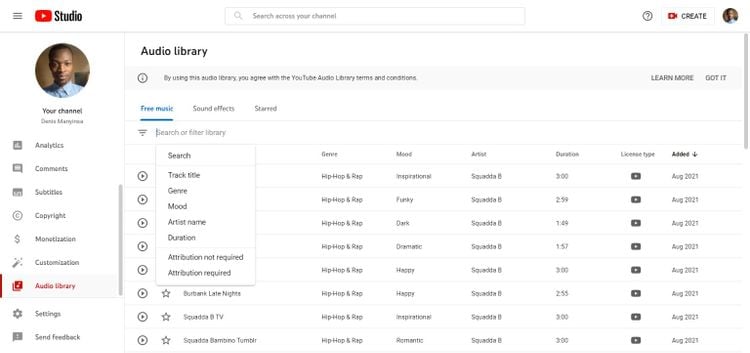
Step 2
You can do the same if you want to search for music based on Genre or Mood.
All you need to do is select the option under Free Music and click on apply.
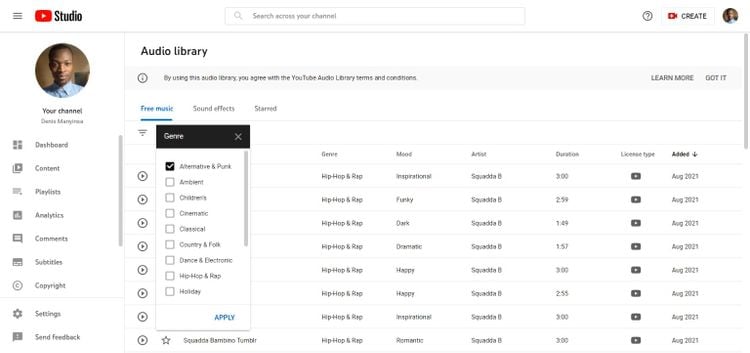
Step 3
Once your searched options appear on the screen, you are provided with the option of listening to them before you proceed to download.
Click on the play option next to the name of the track/music/sound for a preview. Also, if you are searching for multiple audios, you can star the audio using the Star option present on the right of your screen to revisit the audio later.
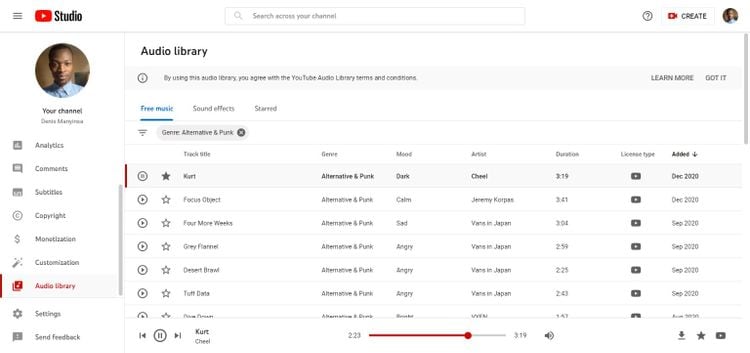
Step4
After you have “Starred” all the audios you want, head on to the starred section and download them using the download option visible on the right of your screen.
Part 5 How to Add Music from Sound Library to My Video?
Now that you have downloaded your desired music for your video, the question arises, how to integrate it into your video?
A straightforward answer to that can be, using YouTube Studio’s built-in video editor. But considering the limited features it has on offer, you might require something that can allow you to add premium features: drag and drop special effects, custom animation on the go, and much more.
So, if you are looking for such features too, then Filmora can be the answer to your requirements. Filmora is a video editing software that allows you to perform some of the most crucial editing tasks with relative ease. From integrating music to a video, to adding special effects or custom animation and color matching in your video, Filmora has got you all covered.
Features
● Adding background music to the video: Music makes everything merry. So, if you want your video to look stunning, you know that music is the key. Hence, Filmora comes with the feature of adding background music/sound to your video that will keep your -audience engaged and entertained throughout it-.
● Audio de-noise: As a content creator, it’s impossible to make sure that there is no noise distraction in the background every time you sit down to record a video. These background noises can be a huge distraction for your viewers and might even annoy them off. Therefore, Filmora has come up with the best de-noise feature to help you reduce the background noises in your video.
● Fade Audio in or out: Like the transition of the scenes in a video, the audio change is equally important. You cannot complete a perfect transition without a proper audio fade. Filmora offers you a more straightforward method to adjust the audio in your video during the transition.
● Beat Detection: Syncing a video has been a hassle for content creators over the years. Beat detection has, however, changed the game completely. In Filmora’s beat detection feature, you can analyze the music and generate beat markers to help you while syncing the audio and special effects.
● Adjust applied audio effects: This is another game-changing feature that helps you lengthen or shorten the length of an impact according to your video. Filmora’s Adjust Audio Effect feature allows you to delay the time of the effect and the factor of effects like echo, lobby, big room etc.
Step by Step Guide for How to Add Music to Video with Filmora:
Step 1 Click on the “Import” option to load your original video to the dashboard of Filmora
You can also simply drag and drop your video from the source file. Your added files will be shown in the left media pane.
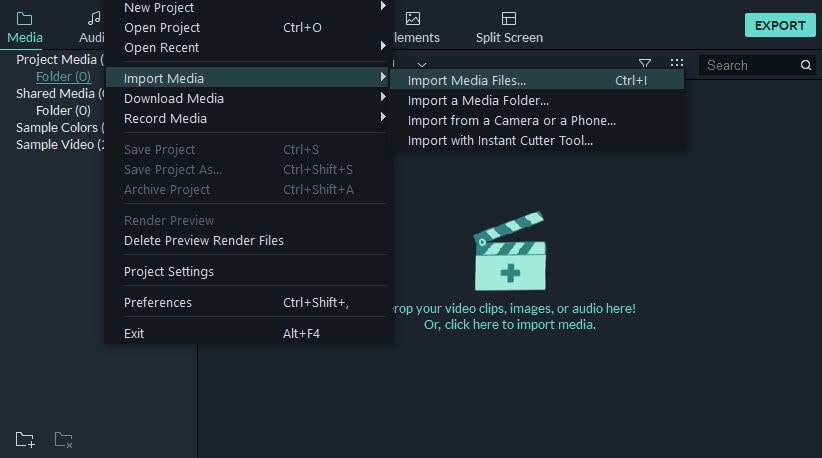
Step 2 For adding music to the video(s), simply drag and drop your music over the video track and position it according to the length of the video
One most significant advantage of using Filmora is that it offers you a wide array of royalty-free sounds. To access this feature, you just have to head to the Audio Library in Filmora and drag and drop the music thumbnails you want.
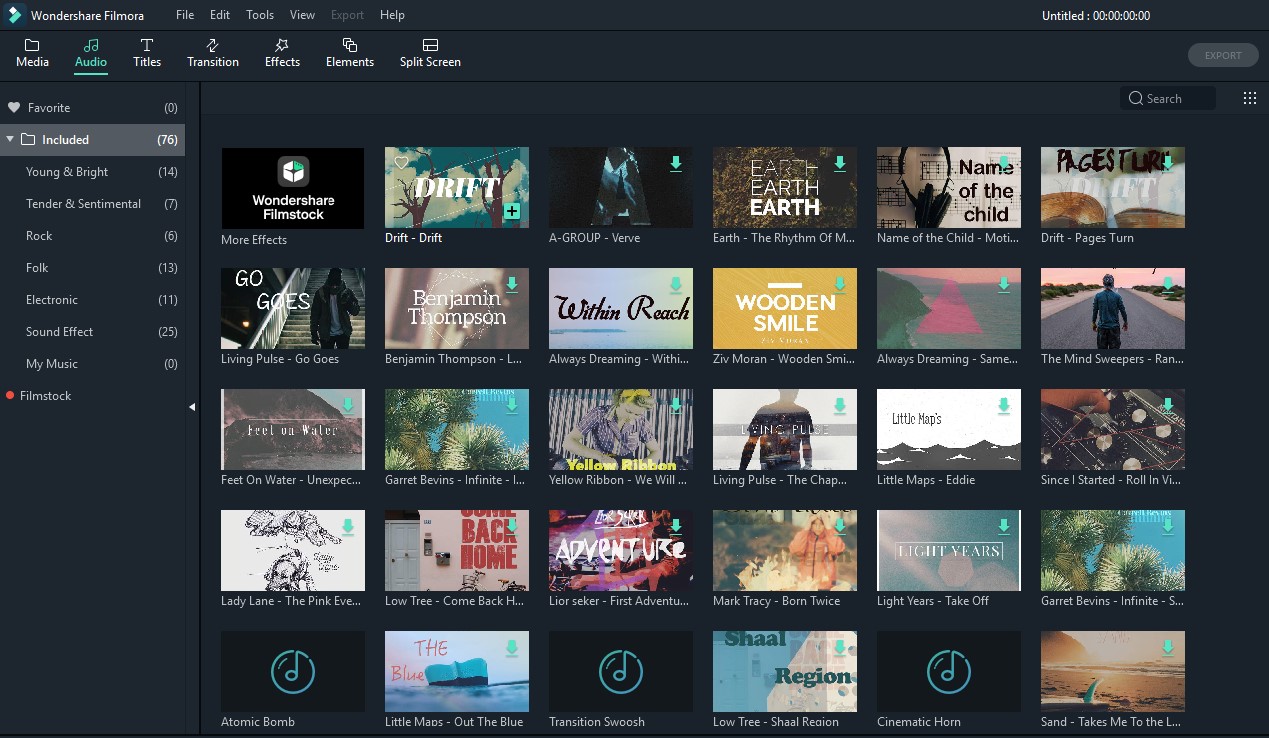
If you want to add extra features to your audio track, you can double click on the track to open the editing panel. Here you can edit the add-on features of the audio like fade in and out, adjust volume, tune the pitch, etc.
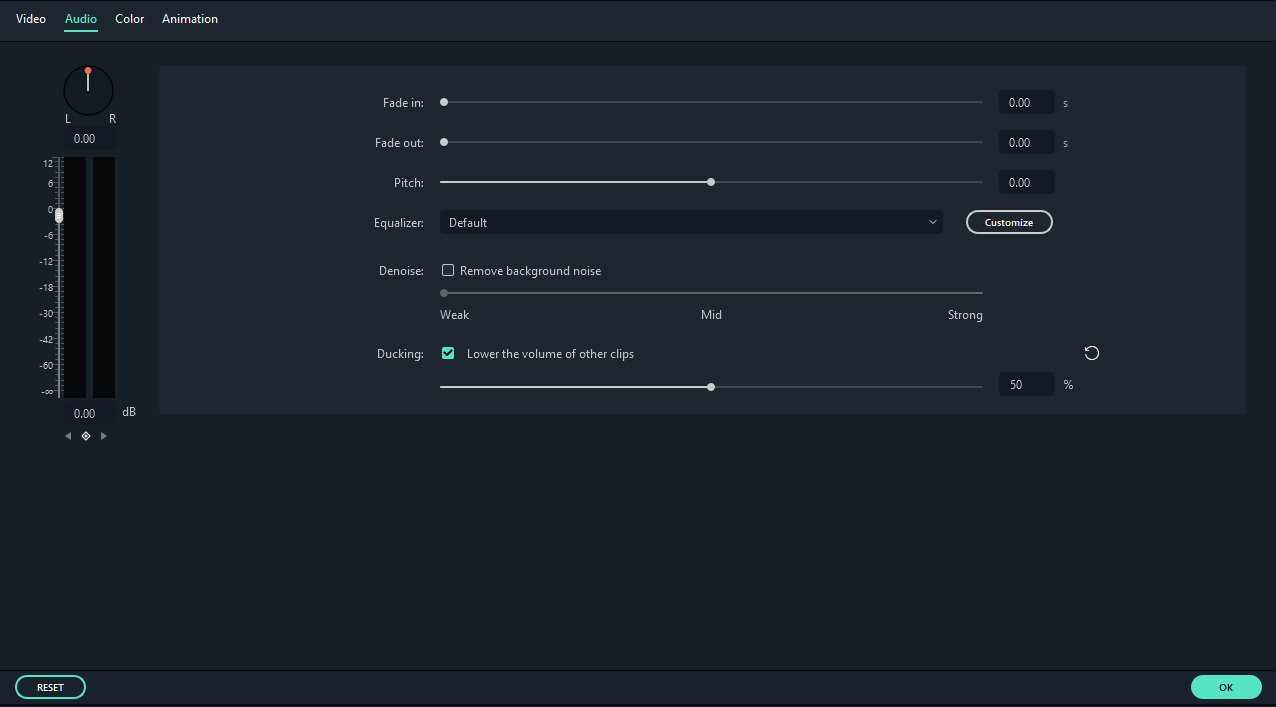
Step 3 Once done, you just have to click on the “Export” option to procure your video. If you want, you can directly upload the video on YouTube
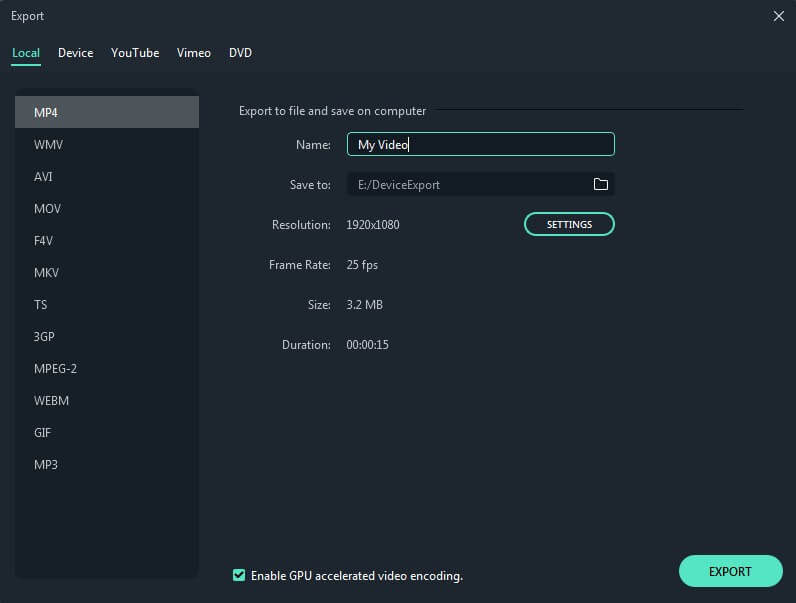
Wondershare Filmora
Get started easily with Filmora’s powerful performance, intuitive interface, and countless effects!
Try It Free Try It Free Try It Free Learn More >

AI Portrait – The best feature of Wondershare Filmora for gameplay editing
The AI Portrait is a new add-on in Wondershare Filmora. It can easily remove video backgrounds without using a green screen or chroma key, allowing you to add borders, glitch effects, pixelated, noise, or segmentation video effects.
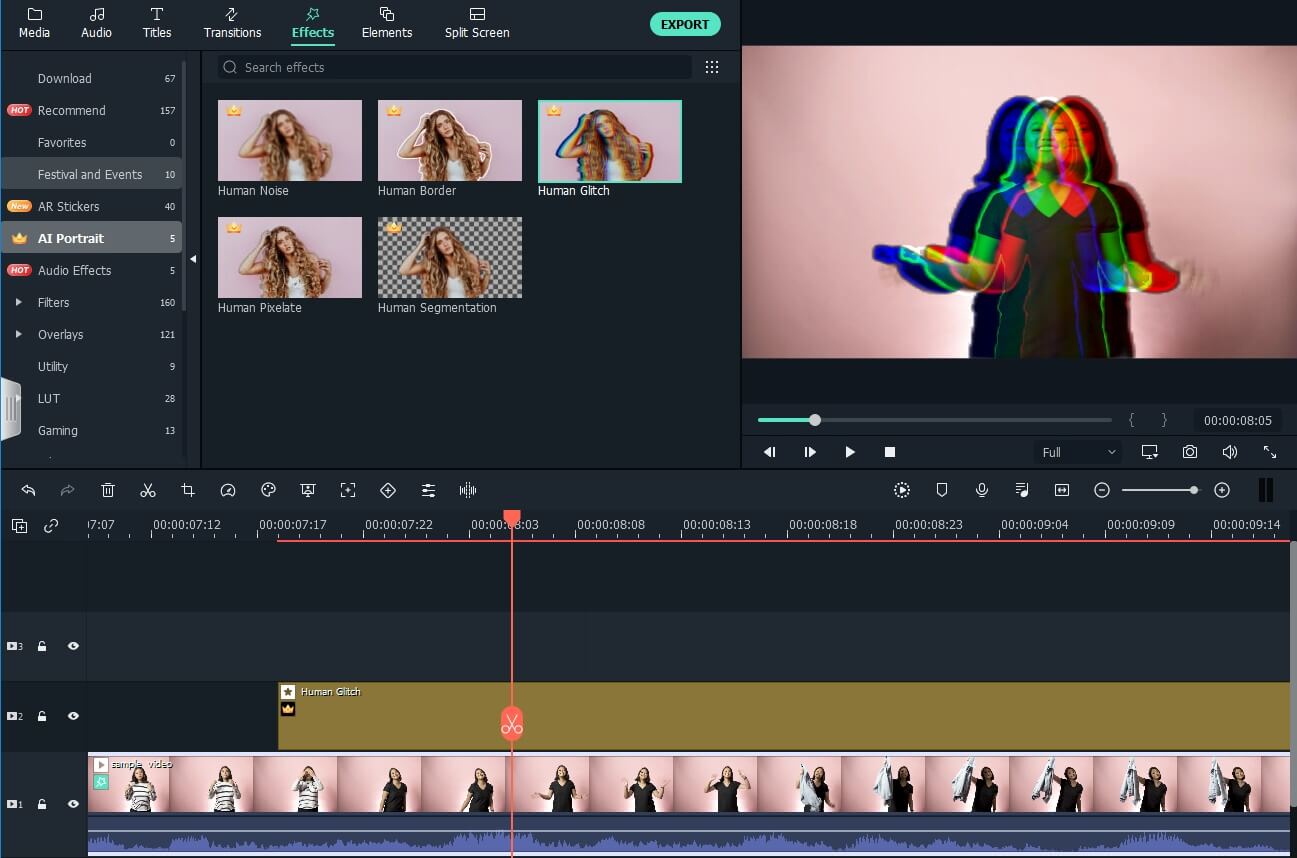
Conclusion
Finding the right audio is not enough to create engaging content in today’s time. You might find the right kind of audio and even use it properly by remaining within the guidelines of YouTube, but it won’t guarantee success.
To be noticeable, you need to know the basics of editing your video in a particular manner to get the most out of it. And Filmora is the best option out there to create one of the most prolific video content. Filmora is your one-stop destination to deliver the best video content with a wide variety of features to choose from.
Sound and music are the whole and soul of a video. They help engage the audience, generate an emotional response, indicate mood, and much more. However, there’s one catch. As a video content creator, you must be already aware that not every sound effect or music you want to add to your video is available for free or available at all. This sometimes can be a real setback for a content creator. But what if I tell you there is a way around it? That you can get the music you want without paying extra bucks for it. Yes, a platform called YouTube Sound Library can resolve your issue. And help you find the music that you are longing for. Want to know how? Then read along.
In this article
01 [Question 1: What is YouTube Sound library?](#Part 1)
02 [Question 2: How to Find YouTube Sound Library?](#Part 2)
03 [Question 3: Is YouTube Sound Library Free?](#Part 3)
04 [Question 4: How Can I Use YouTube Sound Library?](#Part 4)
05 [Question 5: How to Add Music from Sound Library to My Video?](#Part 5)
Part 1 What is YouTube Sound library?
Content creators are always treading the tightrope when it comes to budget. They are always watching out for a way to make their work cost-efficient by cutting costs wherever possible.
Sounds and music are some fields where you cannot afford to be cost-effective, as it is bound to hamper the quality of your final product. But buying the rights of music or sound can also have adverse effects on your purse. This is where YouTube Sound Library can save the day for you.
YouTube Sound Library is a segment of YouTube Studio dedicated to presenting content creators like you with royalty-free music from different genres, moods, and artists around the globe.
Part 2 How to Find YouTube Sound Library?
It’s really easy to find YouTube sound effects library. It doesn’t matter if you are using a computer or a smartphone, it’s the same process that you need to follow. Here is how you can do it –
Step 1
First, you need to open YouTube on your browser and go to “Your Channel” by clicking on the picture icon from the top right corner.
Step 2
Then click on the “Customize Channel” button. This will open the YouTube Creator Studio. You can also directly go to this link and sign into your YouTube Creator Studio .
Step 3
Now from the left panel scroll below the options such as “Dashboard”, “Content”, “Playlists”, etc.
You’ll find the “Audio Library” option below. Select the “Audio Library” option and you’ll get to the YouTube Sound Library.
Part 3 Is YouTube Sound Library Free?
A simple answer to this question is: Yes, YouTube Sound Library is free. The sound or the music you procure from this medium is royalty-free. And using it won’t incur the risk of a copyright strike against your content.
But just like every Google and YouTube tool available on the internet, YouTube Sound Library also comes with a bunch of terms and conditions. As a content creator and user of the audio from the library, you will be required to keep those terms and conditions in mind before using the music. If you somehow breach the guidelines mapped out by YouTube, you run the risk of a copyright strike against your content.
Therefore, before using the audio, thoroughly go through the content usage guidelines. Although they are not rocket science to start with, not honoring them can bite you later on.
Part 4 How Can I Use YouTube Sound Library?
Downloading YouTube audio is very easy. All you need to do is log on to your YouTube profile and access the YouTube Studio option. Once you are at it, follow these simple instructions:
Step 1
Once you click on the “Audio Library” section, you will see tabs, namely, Free Music, Sound effects, and Starred. Right beneath it, you will be able to see a search and filter option. If you click on that, a drop-down menu with options such as: Title name, Genre, Mood, Artist name, etc., will appear in that order. You can select whatever choices suit your purpose and search.

Step 2
You can do the same if you want to search for music based on Genre or Mood.
All you need to do is select the option under Free Music and click on apply.

Step 3
Once your searched options appear on the screen, you are provided with the option of listening to them before you proceed to download.
Click on the play option next to the name of the track/music/sound for a preview. Also, if you are searching for multiple audios, you can star the audio using the Star option present on the right of your screen to revisit the audio later.

Step4
After you have “Starred” all the audios you want, head on to the starred section and download them using the download option visible on the right of your screen.
Part 5 How to Add Music from Sound Library to My Video?
Now that you have downloaded your desired music for your video, the question arises, how to integrate it into your video?
A straightforward answer to that can be, using YouTube Studio’s built-in video editor. But considering the limited features it has on offer, you might require something that can allow you to add premium features: drag and drop special effects, custom animation on the go, and much more.
So, if you are looking for such features too, then Filmora can be the answer to your requirements. Filmora is a video editing software that allows you to perform some of the most crucial editing tasks with relative ease. From integrating music to a video, to adding special effects or custom animation and color matching in your video, Filmora has got you all covered.
Features
● Adding background music to the video: Music makes everything merry. So, if you want your video to look stunning, you know that music is the key. Hence, Filmora comes with the feature of adding background music/sound to your video that will keep your -audience engaged and entertained throughout it-.
● Audio de-noise: As a content creator, it’s impossible to make sure that there is no noise distraction in the background every time you sit down to record a video. These background noises can be a huge distraction for your viewers and might even annoy them off. Therefore, Filmora has come up with the best de-noise feature to help you reduce the background noises in your video.
● Fade Audio in or out: Like the transition of the scenes in a video, the audio change is equally important. You cannot complete a perfect transition without a proper audio fade. Filmora offers you a more straightforward method to adjust the audio in your video during the transition.
● Beat Detection: Syncing a video has been a hassle for content creators over the years. Beat detection has, however, changed the game completely. In Filmora’s beat detection feature, you can analyze the music and generate beat markers to help you while syncing the audio and special effects.
● Adjust applied audio effects: This is another game-changing feature that helps you lengthen or shorten the length of an impact according to your video. Filmora’s Adjust Audio Effect feature allows you to delay the time of the effect and the factor of effects like echo, lobby, big room etc.
Step by Step Guide for How to Add Music to Video with Filmora:
Step 1 Click on the “Import” option to load your original video to the dashboard of Filmora
You can also simply drag and drop your video from the source file. Your added files will be shown in the left media pane.

Step 2 For adding music to the video(s), simply drag and drop your music over the video track and position it according to the length of the video
One most significant advantage of using Filmora is that it offers you a wide array of royalty-free sounds. To access this feature, you just have to head to the Audio Library in Filmora and drag and drop the music thumbnails you want.

If you want to add extra features to your audio track, you can double click on the track to open the editing panel. Here you can edit the add-on features of the audio like fade in and out, adjust volume, tune the pitch, etc.

Step 3 Once done, you just have to click on the “Export” option to procure your video. If you want, you can directly upload the video on YouTube

Wondershare Filmora
Get started easily with Filmora’s powerful performance, intuitive interface, and countless effects!
Try It Free Try It Free Try It Free Learn More >

AI Portrait – The best feature of Wondershare Filmora for gameplay editing
The AI Portrait is a new add-on in Wondershare Filmora. It can easily remove video backgrounds without using a green screen or chroma key, allowing you to add borders, glitch effects, pixelated, noise, or segmentation video effects.

Conclusion
Finding the right audio is not enough to create engaging content in today’s time. You might find the right kind of audio and even use it properly by remaining within the guidelines of YouTube, but it won’t guarantee success.
To be noticeable, you need to know the basics of editing your video in a particular manner to get the most out of it. And Filmora is the best option out there to create one of the most prolific video content. Filmora is your one-stop destination to deliver the best video content with a wide variety of features to choose from.
Sound and music are the whole and soul of a video. They help engage the audience, generate an emotional response, indicate mood, and much more. However, there’s one catch. As a video content creator, you must be already aware that not every sound effect or music you want to add to your video is available for free or available at all. This sometimes can be a real setback for a content creator. But what if I tell you there is a way around it? That you can get the music you want without paying extra bucks for it. Yes, a platform called YouTube Sound Library can resolve your issue. And help you find the music that you are longing for. Want to know how? Then read along.
In this article
01 [Question 1: What is YouTube Sound library?](#Part 1)
02 [Question 2: How to Find YouTube Sound Library?](#Part 2)
03 [Question 3: Is YouTube Sound Library Free?](#Part 3)
04 [Question 4: How Can I Use YouTube Sound Library?](#Part 4)
05 [Question 5: How to Add Music from Sound Library to My Video?](#Part 5)
Part 1 What is YouTube Sound library?
Content creators are always treading the tightrope when it comes to budget. They are always watching out for a way to make their work cost-efficient by cutting costs wherever possible.
Sounds and music are some fields where you cannot afford to be cost-effective, as it is bound to hamper the quality of your final product. But buying the rights of music or sound can also have adverse effects on your purse. This is where YouTube Sound Library can save the day for you.
YouTube Sound Library is a segment of YouTube Studio dedicated to presenting content creators like you with royalty-free music from different genres, moods, and artists around the globe.
Part 2 How to Find YouTube Sound Library?
It’s really easy to find YouTube sound effects library. It doesn’t matter if you are using a computer or a smartphone, it’s the same process that you need to follow. Here is how you can do it –
Step 1
First, you need to open YouTube on your browser and go to “Your Channel” by clicking on the picture icon from the top right corner.
Step 2
Then click on the “Customize Channel” button. This will open the YouTube Creator Studio. You can also directly go to this link and sign into your YouTube Creator Studio .
Step 3
Now from the left panel scroll below the options such as “Dashboard”, “Content”, “Playlists”, etc.
You’ll find the “Audio Library” option below. Select the “Audio Library” option and you’ll get to the YouTube Sound Library.
Part 3 Is YouTube Sound Library Free?
A simple answer to this question is: Yes, YouTube Sound Library is free. The sound or the music you procure from this medium is royalty-free. And using it won’t incur the risk of a copyright strike against your content.
But just like every Google and YouTube tool available on the internet, YouTube Sound Library also comes with a bunch of terms and conditions. As a content creator and user of the audio from the library, you will be required to keep those terms and conditions in mind before using the music. If you somehow breach the guidelines mapped out by YouTube, you run the risk of a copyright strike against your content.
Therefore, before using the audio, thoroughly go through the content usage guidelines. Although they are not rocket science to start with, not honoring them can bite you later on.
Part 4 How Can I Use YouTube Sound Library?
Downloading YouTube audio is very easy. All you need to do is log on to your YouTube profile and access the YouTube Studio option. Once you are at it, follow these simple instructions:
Step 1
Once you click on the “Audio Library” section, you will see tabs, namely, Free Music, Sound effects, and Starred. Right beneath it, you will be able to see a search and filter option. If you click on that, a drop-down menu with options such as: Title name, Genre, Mood, Artist name, etc., will appear in that order. You can select whatever choices suit your purpose and search.

Step 2
You can do the same if you want to search for music based on Genre or Mood.
All you need to do is select the option under Free Music and click on apply.

Step 3
Once your searched options appear on the screen, you are provided with the option of listening to them before you proceed to download.
Click on the play option next to the name of the track/music/sound for a preview. Also, if you are searching for multiple audios, you can star the audio using the Star option present on the right of your screen to revisit the audio later.

Step4
After you have “Starred” all the audios you want, head on to the starred section and download them using the download option visible on the right of your screen.
Part 5 How to Add Music from Sound Library to My Video?
Now that you have downloaded your desired music for your video, the question arises, how to integrate it into your video?
A straightforward answer to that can be, using YouTube Studio’s built-in video editor. But considering the limited features it has on offer, you might require something that can allow you to add premium features: drag and drop special effects, custom animation on the go, and much more.
So, if you are looking for such features too, then Filmora can be the answer to your requirements. Filmora is a video editing software that allows you to perform some of the most crucial editing tasks with relative ease. From integrating music to a video, to adding special effects or custom animation and color matching in your video, Filmora has got you all covered.
Features
● Adding background music to the video: Music makes everything merry. So, if you want your video to look stunning, you know that music is the key. Hence, Filmora comes with the feature of adding background music/sound to your video that will keep your -audience engaged and entertained throughout it-.
● Audio de-noise: As a content creator, it’s impossible to make sure that there is no noise distraction in the background every time you sit down to record a video. These background noises can be a huge distraction for your viewers and might even annoy them off. Therefore, Filmora has come up with the best de-noise feature to help you reduce the background noises in your video.
● Fade Audio in or out: Like the transition of the scenes in a video, the audio change is equally important. You cannot complete a perfect transition without a proper audio fade. Filmora offers you a more straightforward method to adjust the audio in your video during the transition.
● Beat Detection: Syncing a video has been a hassle for content creators over the years. Beat detection has, however, changed the game completely. In Filmora’s beat detection feature, you can analyze the music and generate beat markers to help you while syncing the audio and special effects.
● Adjust applied audio effects: This is another game-changing feature that helps you lengthen or shorten the length of an impact according to your video. Filmora’s Adjust Audio Effect feature allows you to delay the time of the effect and the factor of effects like echo, lobby, big room etc.
Step by Step Guide for How to Add Music to Video with Filmora:
Step 1 Click on the “Import” option to load your original video to the dashboard of Filmora
You can also simply drag and drop your video from the source file. Your added files will be shown in the left media pane.

Step 2 For adding music to the video(s), simply drag and drop your music over the video track and position it according to the length of the video
One most significant advantage of using Filmora is that it offers you a wide array of royalty-free sounds. To access this feature, you just have to head to the Audio Library in Filmora and drag and drop the music thumbnails you want.

If you want to add extra features to your audio track, you can double click on the track to open the editing panel. Here you can edit the add-on features of the audio like fade in and out, adjust volume, tune the pitch, etc.

Step 3 Once done, you just have to click on the “Export” option to procure your video. If you want, you can directly upload the video on YouTube

Wondershare Filmora
Get started easily with Filmora’s powerful performance, intuitive interface, and countless effects!
Try It Free Try It Free Try It Free Learn More >

AI Portrait – The best feature of Wondershare Filmora for gameplay editing
The AI Portrait is a new add-on in Wondershare Filmora. It can easily remove video backgrounds without using a green screen or chroma key, allowing you to add borders, glitch effects, pixelated, noise, or segmentation video effects.

Conclusion
Finding the right audio is not enough to create engaging content in today’s time. You might find the right kind of audio and even use it properly by remaining within the guidelines of YouTube, but it won’t guarantee success.
To be noticeable, you need to know the basics of editing your video in a particular manner to get the most out of it. And Filmora is the best option out there to create one of the most prolific video content. Filmora is your one-stop destination to deliver the best video content with a wide variety of features to choose from.
Sound and music are the whole and soul of a video. They help engage the audience, generate an emotional response, indicate mood, and much more. However, there’s one catch. As a video content creator, you must be already aware that not every sound effect or music you want to add to your video is available for free or available at all. This sometimes can be a real setback for a content creator. But what if I tell you there is a way around it? That you can get the music you want without paying extra bucks for it. Yes, a platform called YouTube Sound Library can resolve your issue. And help you find the music that you are longing for. Want to know how? Then read along.
In this article
01 [Question 1: What is YouTube Sound library?](#Part 1)
02 [Question 2: How to Find YouTube Sound Library?](#Part 2)
03 [Question 3: Is YouTube Sound Library Free?](#Part 3)
04 [Question 4: How Can I Use YouTube Sound Library?](#Part 4)
05 [Question 5: How to Add Music from Sound Library to My Video?](#Part 5)
Part 1 What is YouTube Sound library?
Content creators are always treading the tightrope when it comes to budget. They are always watching out for a way to make their work cost-efficient by cutting costs wherever possible.
Sounds and music are some fields where you cannot afford to be cost-effective, as it is bound to hamper the quality of your final product. But buying the rights of music or sound can also have adverse effects on your purse. This is where YouTube Sound Library can save the day for you.
YouTube Sound Library is a segment of YouTube Studio dedicated to presenting content creators like you with royalty-free music from different genres, moods, and artists around the globe.
Part 2 How to Find YouTube Sound Library?
It’s really easy to find YouTube sound effects library. It doesn’t matter if you are using a computer or a smartphone, it’s the same process that you need to follow. Here is how you can do it –
Step 1
First, you need to open YouTube on your browser and go to “Your Channel” by clicking on the picture icon from the top right corner.
Step 2
Then click on the “Customize Channel” button. This will open the YouTube Creator Studio. You can also directly go to this link and sign into your YouTube Creator Studio .
Step 3
Now from the left panel scroll below the options such as “Dashboard”, “Content”, “Playlists”, etc.
You’ll find the “Audio Library” option below. Select the “Audio Library” option and you’ll get to the YouTube Sound Library.
Part 3 Is YouTube Sound Library Free?
A simple answer to this question is: Yes, YouTube Sound Library is free. The sound or the music you procure from this medium is royalty-free. And using it won’t incur the risk of a copyright strike against your content.
But just like every Google and YouTube tool available on the internet, YouTube Sound Library also comes with a bunch of terms and conditions. As a content creator and user of the audio from the library, you will be required to keep those terms and conditions in mind before using the music. If you somehow breach the guidelines mapped out by YouTube, you run the risk of a copyright strike against your content.
Therefore, before using the audio, thoroughly go through the content usage guidelines. Although they are not rocket science to start with, not honoring them can bite you later on.
Part 4 How Can I Use YouTube Sound Library?
Downloading YouTube audio is very easy. All you need to do is log on to your YouTube profile and access the YouTube Studio option. Once you are at it, follow these simple instructions:
Step 1
Once you click on the “Audio Library” section, you will see tabs, namely, Free Music, Sound effects, and Starred. Right beneath it, you will be able to see a search and filter option. If you click on that, a drop-down menu with options such as: Title name, Genre, Mood, Artist name, etc., will appear in that order. You can select whatever choices suit your purpose and search.

Step 2
You can do the same if you want to search for music based on Genre or Mood.
All you need to do is select the option under Free Music and click on apply.

Step 3
Once your searched options appear on the screen, you are provided with the option of listening to them before you proceed to download.
Click on the play option next to the name of the track/music/sound for a preview. Also, if you are searching for multiple audios, you can star the audio using the Star option present on the right of your screen to revisit the audio later.

Step4
After you have “Starred” all the audios you want, head on to the starred section and download them using the download option visible on the right of your screen.
Part 5 How to Add Music from Sound Library to My Video?
Now that you have downloaded your desired music for your video, the question arises, how to integrate it into your video?
A straightforward answer to that can be, using YouTube Studio’s built-in video editor. But considering the limited features it has on offer, you might require something that can allow you to add premium features: drag and drop special effects, custom animation on the go, and much more.
So, if you are looking for such features too, then Filmora can be the answer to your requirements. Filmora is a video editing software that allows you to perform some of the most crucial editing tasks with relative ease. From integrating music to a video, to adding special effects or custom animation and color matching in your video, Filmora has got you all covered.
Features
● Adding background music to the video: Music makes everything merry. So, if you want your video to look stunning, you know that music is the key. Hence, Filmora comes with the feature of adding background music/sound to your video that will keep your -audience engaged and entertained throughout it-.
● Audio de-noise: As a content creator, it’s impossible to make sure that there is no noise distraction in the background every time you sit down to record a video. These background noises can be a huge distraction for your viewers and might even annoy them off. Therefore, Filmora has come up with the best de-noise feature to help you reduce the background noises in your video.
● Fade Audio in or out: Like the transition of the scenes in a video, the audio change is equally important. You cannot complete a perfect transition without a proper audio fade. Filmora offers you a more straightforward method to adjust the audio in your video during the transition.
● Beat Detection: Syncing a video has been a hassle for content creators over the years. Beat detection has, however, changed the game completely. In Filmora’s beat detection feature, you can analyze the music and generate beat markers to help you while syncing the audio and special effects.
● Adjust applied audio effects: This is another game-changing feature that helps you lengthen or shorten the length of an impact according to your video. Filmora’s Adjust Audio Effect feature allows you to delay the time of the effect and the factor of effects like echo, lobby, big room etc.
Step by Step Guide for How to Add Music to Video with Filmora:
Step 1 Click on the “Import” option to load your original video to the dashboard of Filmora
You can also simply drag and drop your video from the source file. Your added files will be shown in the left media pane.

Step 2 For adding music to the video(s), simply drag and drop your music over the video track and position it according to the length of the video
One most significant advantage of using Filmora is that it offers you a wide array of royalty-free sounds. To access this feature, you just have to head to the Audio Library in Filmora and drag and drop the music thumbnails you want.

If you want to add extra features to your audio track, you can double click on the track to open the editing panel. Here you can edit the add-on features of the audio like fade in and out, adjust volume, tune the pitch, etc.

Step 3 Once done, you just have to click on the “Export” option to procure your video. If you want, you can directly upload the video on YouTube

Wondershare Filmora
Get started easily with Filmora’s powerful performance, intuitive interface, and countless effects!
Try It Free Try It Free Try It Free Learn More >

AI Portrait – The best feature of Wondershare Filmora for gameplay editing
The AI Portrait is a new add-on in Wondershare Filmora. It can easily remove video backgrounds without using a green screen or chroma key, allowing you to add borders, glitch effects, pixelated, noise, or segmentation video effects.

Conclusion
Finding the right audio is not enough to create engaging content in today’s time. You might find the right kind of audio and even use it properly by remaining within the guidelines of YouTube, but it won’t guarantee success.
To be noticeable, you need to know the basics of editing your video in a particular manner to get the most out of it. And Filmora is the best option out there to create one of the most prolific video content. Filmora is your one-stop destination to deliver the best video content with a wide variety of features to choose from.
“Switch to Quiet Mode and Tailor Your Media Project with Personalized Sound Layers in the Movie Maker Application by Microsoft
How to Mute Audio in Windows Movie Maker?

Shanoon Cox
Mar 27, 2024• Proven solutions
Recording high-quality videos with Smartphones and consumer-level cameras is easy, but unfortunately the same can’t be said for the sound. The camera microphones often record low-quality audio and they pick up background noises that can make the video unwatchable.
In case you were looking for a quick way to mute or remove the audio in your videos, you came to the right place because in this article we are going to show you how you can mute audio in Windows Movie Maker or add new audio files to videos. We’re also going to provide you with an alternative solution that lets you have more control over the audio editing process.
- Part 1: How to Mute Audio in Windows Movie Maker?
- Part 2: Adding a New Audio Clip to a Video
- Part 3: A Better Way to Replace Original Audio on Windows
Part 1: How to Mute Audio in Windows Movie Maker?
Muting the audio in a video clip is simple, regardless of the video editing software you’re using. Windows Movie Maker lets you mute audio in just a few steps, so let’s see how you can mute videos with this video editor.
Step 1: In order to start editing a video, you must first import it into Windows Movie Maker. Click on the Add Videos and Photos icon in the software’s Home tab and proceed to select the clip you’d like to mute.
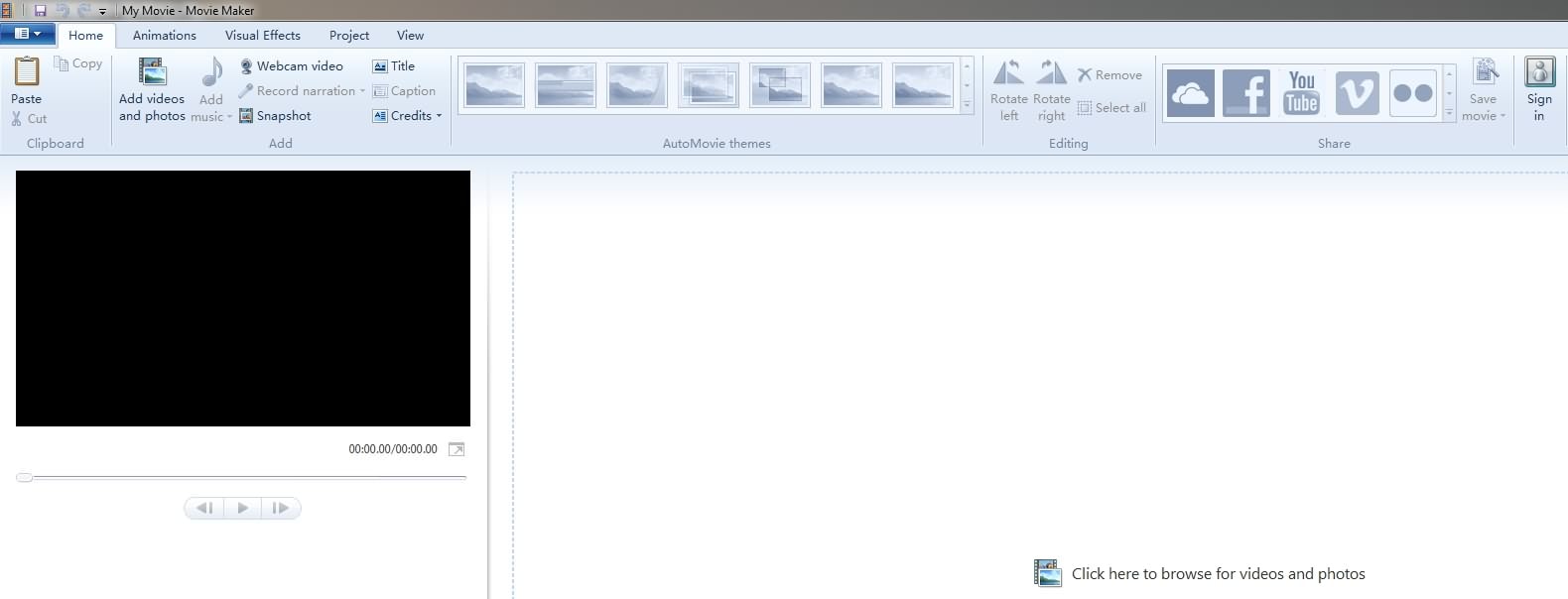
Click on the Open button in the Add Videos and Photos window and your clip will be imported into the software.
Step 2: After you added a clip to the storyboard you can preview it in order to decide which parts of the video you’d like to mute. Click on the Edit menu in the software’s ribbon, to gain access to the video editing tools Windows Movie Maker has to offer.
If you would like to mute only a portion of a video clip, you should position the playhead on the storyline at the exact location in the video where you want to make the cut and then click on the Split button.
Step 3: Make sure that the clip you want to mute is selected and click on the Video Volume icon on the left side of the Edit tab.
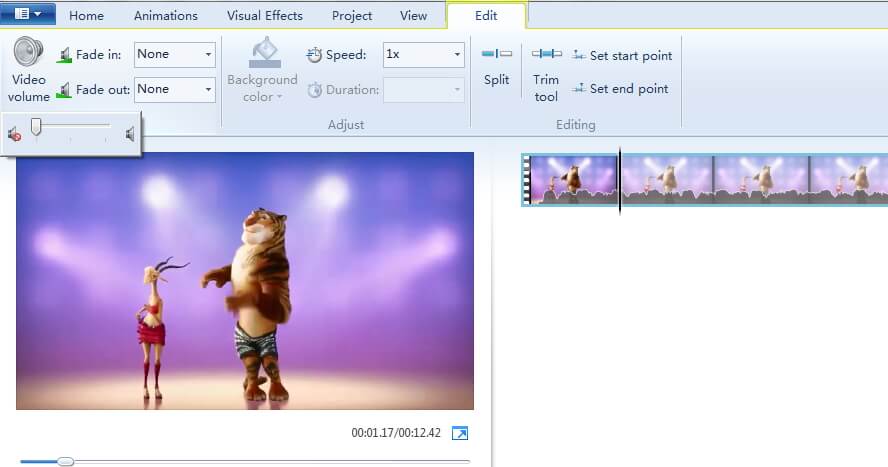
Drag the slider all the way to the left to mute the audio. Click the Play button in the preview window to make sure that video’s sound is muted.
Part 2: Adding a New Audio Clip to a Video
Windows Movie Maker also lets you replace the existing audio clip with a new one. Once again, this process is easy and it can be completed in a few steps.
Step 1: After you’ve muted the audio, click on the Add Music icon, that is located next to the Add Photos and Videos icon in the Home tab.

A drop-down menu will appear offering you to select music from an online source or to import an audio file from your computer. Moreover, you can select the starting point of the song you’re importing so you don’t have to adjust the position of the audio file in your project manually.
In order to do this, you just have to position the playhead at the desired location and select the Add music at the current point option from the drop-down menu. You can change the position of the audio file by dragging it to a new location in the storyboard. Using MP3 or WMA audio file is recommended since other audio file formats may not be compatible with Windows Movie maker.
Step 2: The audio file you imported will be automatically added to the video clip on the Storyboard. Click Play in the preview window to check if you like the result. Head over to the File menu and click on the Save Movie option. Windows Movie Maker will offer you a number of different options and if you’d like to save your video to the computer, you should select the For Computer option.

Part 3: Wondershare Filmora - A Better Way to Replace Audio Files in Videos on Windows OS
Windows Movie Maker has been discontinued a while ago, and its video and audio editing tools only enable you to perform basic video editing tasks. We suggest using Wondershare Filmora if you would like to mute or replace audio files in your videos because it offers more powerful audio and video editing features. Here’s how you can mute or replace audio files in Wondershare Filmora.
Step 1: Import the video clip into the software, by clicking on the Import button and then selecting the Import Media Files option. If you want to replace the audio of the clip you can also select the new audio file from your hard drive and click on the Open button. Filmora offers a rich royalty free music library, you can use if you already don’t have the music you want to add to your video.
Step 2: Drag and drop the video file to the timeline and then right-click on it. Select the Audio Detach option from the context menu. The audio file will appear in the newly created audio track, and you can just click on the Volume icon located at the begging of the audio track to mute that audio track.
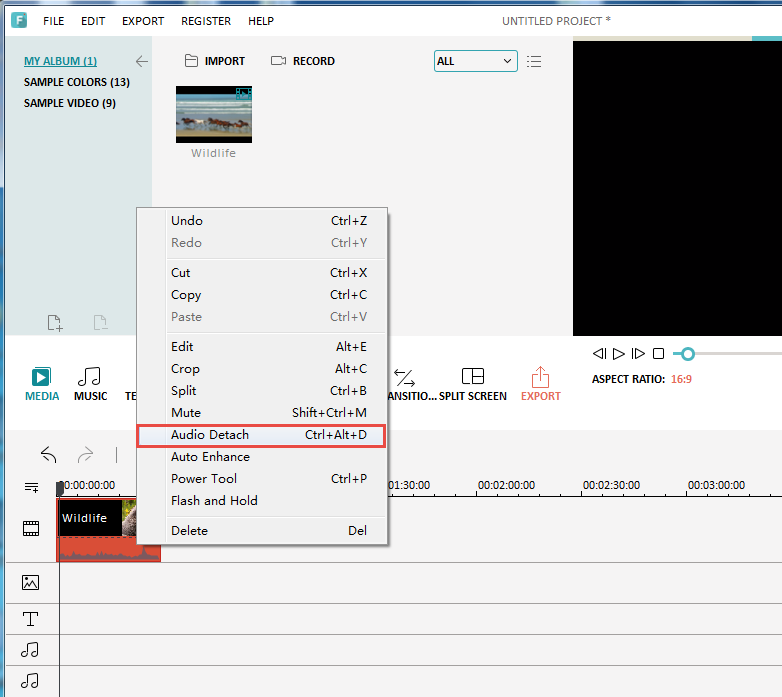
For more details, check our guide about How to remove audio from video in Filmora on Windows.
If you want to add a new audio clip to your project and replace the old one, you should select the existing audio file and press the delete button on your keyboard. You can then drag and drop the new audio file to the timeline from the software’s Media Bin, or the Music tab, in case you decide to use songs featured in Filmora’s music library. You can cut, trim or adjust the start and end position of the audio file or use some of the audio effects the software offers. When done, click on the Export button and select the output format that is most suitable for the project you’re working on.
Conclusion
Videos that have poor sound quality won’t impress anyone, but you shouldn’t worry because muting or replacing audio files is a task that requires almost no effort. Windows Movie Maker can be used to quickly mute an audio file, but if you want to have access to more professional audio editing tools using Wondershare Filmora is a much better option. What’s your favorite method of replacing audio files in videos? Leave a comment and let us know.

Shanoon Cox
Shanoon Cox is a writer and a lover of all things video.
Follow @Shanoon Cox
Shanoon Cox
Mar 27, 2024• Proven solutions
Recording high-quality videos with Smartphones and consumer-level cameras is easy, but unfortunately the same can’t be said for the sound. The camera microphones often record low-quality audio and they pick up background noises that can make the video unwatchable.
In case you were looking for a quick way to mute or remove the audio in your videos, you came to the right place because in this article we are going to show you how you can mute audio in Windows Movie Maker or add new audio files to videos. We’re also going to provide you with an alternative solution that lets you have more control over the audio editing process.
- Part 1: How to Mute Audio in Windows Movie Maker?
- Part 2: Adding a New Audio Clip to a Video
- Part 3: A Better Way to Replace Original Audio on Windows
Part 1: How to Mute Audio in Windows Movie Maker?
Muting the audio in a video clip is simple, regardless of the video editing software you’re using. Windows Movie Maker lets you mute audio in just a few steps, so let’s see how you can mute videos with this video editor.
Step 1: In order to start editing a video, you must first import it into Windows Movie Maker. Click on the Add Videos and Photos icon in the software’s Home tab and proceed to select the clip you’d like to mute.

Click on the Open button in the Add Videos and Photos window and your clip will be imported into the software.
Step 2: After you added a clip to the storyboard you can preview it in order to decide which parts of the video you’d like to mute. Click on the Edit menu in the software’s ribbon, to gain access to the video editing tools Windows Movie Maker has to offer.
If you would like to mute only a portion of a video clip, you should position the playhead on the storyline at the exact location in the video where you want to make the cut and then click on the Split button.
Step 3: Make sure that the clip you want to mute is selected and click on the Video Volume icon on the left side of the Edit tab.

Drag the slider all the way to the left to mute the audio. Click the Play button in the preview window to make sure that video’s sound is muted.
Part 2: Adding a New Audio Clip to a Video
Windows Movie Maker also lets you replace the existing audio clip with a new one. Once again, this process is easy and it can be completed in a few steps.
Step 1: After you’ve muted the audio, click on the Add Music icon, that is located next to the Add Photos and Videos icon in the Home tab.

A drop-down menu will appear offering you to select music from an online source or to import an audio file from your computer. Moreover, you can select the starting point of the song you’re importing so you don’t have to adjust the position of the audio file in your project manually.
In order to do this, you just have to position the playhead at the desired location and select the Add music at the current point option from the drop-down menu. You can change the position of the audio file by dragging it to a new location in the storyboard. Using MP3 or WMA audio file is recommended since other audio file formats may not be compatible with Windows Movie maker.
Step 2: The audio file you imported will be automatically added to the video clip on the Storyboard. Click Play in the preview window to check if you like the result. Head over to the File menu and click on the Save Movie option. Windows Movie Maker will offer you a number of different options and if you’d like to save your video to the computer, you should select the For Computer option.

Part 3: Wondershare Filmora - A Better Way to Replace Audio Files in Videos on Windows OS
Windows Movie Maker has been discontinued a while ago, and its video and audio editing tools only enable you to perform basic video editing tasks. We suggest using Wondershare Filmora if you would like to mute or replace audio files in your videos because it offers more powerful audio and video editing features. Here’s how you can mute or replace audio files in Wondershare Filmora.
Step 1: Import the video clip into the software, by clicking on the Import button and then selecting the Import Media Files option. If you want to replace the audio of the clip you can also select the new audio file from your hard drive and click on the Open button. Filmora offers a rich royalty free music library, you can use if you already don’t have the music you want to add to your video.
Step 2: Drag and drop the video file to the timeline and then right-click on it. Select the Audio Detach option from the context menu. The audio file will appear in the newly created audio track, and you can just click on the Volume icon located at the begging of the audio track to mute that audio track.

For more details, check our guide about How to remove audio from video in Filmora on Windows.
If you want to add a new audio clip to your project and replace the old one, you should select the existing audio file and press the delete button on your keyboard. You can then drag and drop the new audio file to the timeline from the software’s Media Bin, or the Music tab, in case you decide to use songs featured in Filmora’s music library. You can cut, trim or adjust the start and end position of the audio file or use some of the audio effects the software offers. When done, click on the Export button and select the output format that is most suitable for the project you’re working on.
Conclusion
Videos that have poor sound quality won’t impress anyone, but you shouldn’t worry because muting or replacing audio files is a task that requires almost no effort. Windows Movie Maker can be used to quickly mute an audio file, but if you want to have access to more professional audio editing tools using Wondershare Filmora is a much better option. What’s your favorite method of replacing audio files in videos? Leave a comment and let us know.

Shanoon Cox
Shanoon Cox is a writer and a lover of all things video.
Follow @Shanoon Cox
Shanoon Cox
Mar 27, 2024• Proven solutions
Recording high-quality videos with Smartphones and consumer-level cameras is easy, but unfortunately the same can’t be said for the sound. The camera microphones often record low-quality audio and they pick up background noises that can make the video unwatchable.
In case you were looking for a quick way to mute or remove the audio in your videos, you came to the right place because in this article we are going to show you how you can mute audio in Windows Movie Maker or add new audio files to videos. We’re also going to provide you with an alternative solution that lets you have more control over the audio editing process.
- Part 1: How to Mute Audio in Windows Movie Maker?
- Part 2: Adding a New Audio Clip to a Video
- Part 3: A Better Way to Replace Original Audio on Windows
Part 1: How to Mute Audio in Windows Movie Maker?
Muting the audio in a video clip is simple, regardless of the video editing software you’re using. Windows Movie Maker lets you mute audio in just a few steps, so let’s see how you can mute videos with this video editor.
Step 1: In order to start editing a video, you must first import it into Windows Movie Maker. Click on the Add Videos and Photos icon in the software’s Home tab and proceed to select the clip you’d like to mute.

Click on the Open button in the Add Videos and Photos window and your clip will be imported into the software.
Step 2: After you added a clip to the storyboard you can preview it in order to decide which parts of the video you’d like to mute. Click on the Edit menu in the software’s ribbon, to gain access to the video editing tools Windows Movie Maker has to offer.
If you would like to mute only a portion of a video clip, you should position the playhead on the storyline at the exact location in the video where you want to make the cut and then click on the Split button.
Step 3: Make sure that the clip you want to mute is selected and click on the Video Volume icon on the left side of the Edit tab.

Drag the slider all the way to the left to mute the audio. Click the Play button in the preview window to make sure that video’s sound is muted.
Part 2: Adding a New Audio Clip to a Video
Windows Movie Maker also lets you replace the existing audio clip with a new one. Once again, this process is easy and it can be completed in a few steps.
Step 1: After you’ve muted the audio, click on the Add Music icon, that is located next to the Add Photos and Videos icon in the Home tab.

A drop-down menu will appear offering you to select music from an online source or to import an audio file from your computer. Moreover, you can select the starting point of the song you’re importing so you don’t have to adjust the position of the audio file in your project manually.
In order to do this, you just have to position the playhead at the desired location and select the Add music at the current point option from the drop-down menu. You can change the position of the audio file by dragging it to a new location in the storyboard. Using MP3 or WMA audio file is recommended since other audio file formats may not be compatible with Windows Movie maker.
Step 2: The audio file you imported will be automatically added to the video clip on the Storyboard. Click Play in the preview window to check if you like the result. Head over to the File menu and click on the Save Movie option. Windows Movie Maker will offer you a number of different options and if you’d like to save your video to the computer, you should select the For Computer option.

Part 3: Wondershare Filmora - A Better Way to Replace Audio Files in Videos on Windows OS
Windows Movie Maker has been discontinued a while ago, and its video and audio editing tools only enable you to perform basic video editing tasks. We suggest using Wondershare Filmora if you would like to mute or replace audio files in your videos because it offers more powerful audio and video editing features. Here’s how you can mute or replace audio files in Wondershare Filmora.
Step 1: Import the video clip into the software, by clicking on the Import button and then selecting the Import Media Files option. If you want to replace the audio of the clip you can also select the new audio file from your hard drive and click on the Open button. Filmora offers a rich royalty free music library, you can use if you already don’t have the music you want to add to your video.
Step 2: Drag and drop the video file to the timeline and then right-click on it. Select the Audio Detach option from the context menu. The audio file will appear in the newly created audio track, and you can just click on the Volume icon located at the begging of the audio track to mute that audio track.

For more details, check our guide about How to remove audio from video in Filmora on Windows.
If you want to add a new audio clip to your project and replace the old one, you should select the existing audio file and press the delete button on your keyboard. You can then drag and drop the new audio file to the timeline from the software’s Media Bin, or the Music tab, in case you decide to use songs featured in Filmora’s music library. You can cut, trim or adjust the start and end position of the audio file or use some of the audio effects the software offers. When done, click on the Export button and select the output format that is most suitable for the project you’re working on.
Conclusion
Videos that have poor sound quality won’t impress anyone, but you shouldn’t worry because muting or replacing audio files is a task that requires almost no effort. Windows Movie Maker can be used to quickly mute an audio file, but if you want to have access to more professional audio editing tools using Wondershare Filmora is a much better option. What’s your favorite method of replacing audio files in videos? Leave a comment and let us know.

Shanoon Cox
Shanoon Cox is a writer and a lover of all things video.
Follow @Shanoon Cox
Shanoon Cox
Mar 27, 2024• Proven solutions
Recording high-quality videos with Smartphones and consumer-level cameras is easy, but unfortunately the same can’t be said for the sound. The camera microphones often record low-quality audio and they pick up background noises that can make the video unwatchable.
In case you were looking for a quick way to mute or remove the audio in your videos, you came to the right place because in this article we are going to show you how you can mute audio in Windows Movie Maker or add new audio files to videos. We’re also going to provide you with an alternative solution that lets you have more control over the audio editing process.
- Part 1: How to Mute Audio in Windows Movie Maker?
- Part 2: Adding a New Audio Clip to a Video
- Part 3: A Better Way to Replace Original Audio on Windows
Part 1: How to Mute Audio in Windows Movie Maker?
Muting the audio in a video clip is simple, regardless of the video editing software you’re using. Windows Movie Maker lets you mute audio in just a few steps, so let’s see how you can mute videos with this video editor.
Step 1: In order to start editing a video, you must first import it into Windows Movie Maker. Click on the Add Videos and Photos icon in the software’s Home tab and proceed to select the clip you’d like to mute.

Click on the Open button in the Add Videos and Photos window and your clip will be imported into the software.
Step 2: After you added a clip to the storyboard you can preview it in order to decide which parts of the video you’d like to mute. Click on the Edit menu in the software’s ribbon, to gain access to the video editing tools Windows Movie Maker has to offer.
If you would like to mute only a portion of a video clip, you should position the playhead on the storyline at the exact location in the video where you want to make the cut and then click on the Split button.
Step 3: Make sure that the clip you want to mute is selected and click on the Video Volume icon on the left side of the Edit tab.

Drag the slider all the way to the left to mute the audio. Click the Play button in the preview window to make sure that video’s sound is muted.
Part 2: Adding a New Audio Clip to a Video
Windows Movie Maker also lets you replace the existing audio clip with a new one. Once again, this process is easy and it can be completed in a few steps.
Step 1: After you’ve muted the audio, click on the Add Music icon, that is located next to the Add Photos and Videos icon in the Home tab.

A drop-down menu will appear offering you to select music from an online source or to import an audio file from your computer. Moreover, you can select the starting point of the song you’re importing so you don’t have to adjust the position of the audio file in your project manually.
In order to do this, you just have to position the playhead at the desired location and select the Add music at the current point option from the drop-down menu. You can change the position of the audio file by dragging it to a new location in the storyboard. Using MP3 or WMA audio file is recommended since other audio file formats may not be compatible with Windows Movie maker.
Step 2: The audio file you imported will be automatically added to the video clip on the Storyboard. Click Play in the preview window to check if you like the result. Head over to the File menu and click on the Save Movie option. Windows Movie Maker will offer you a number of different options and if you’d like to save your video to the computer, you should select the For Computer option.

Part 3: Wondershare Filmora - A Better Way to Replace Audio Files in Videos on Windows OS
Windows Movie Maker has been discontinued a while ago, and its video and audio editing tools only enable you to perform basic video editing tasks. We suggest using Wondershare Filmora if you would like to mute or replace audio files in your videos because it offers more powerful audio and video editing features. Here’s how you can mute or replace audio files in Wondershare Filmora.
Step 1: Import the video clip into the software, by clicking on the Import button and then selecting the Import Media Files option. If you want to replace the audio of the clip you can also select the new audio file from your hard drive and click on the Open button. Filmora offers a rich royalty free music library, you can use if you already don’t have the music you want to add to your video.
Step 2: Drag and drop the video file to the timeline and then right-click on it. Select the Audio Detach option from the context menu. The audio file will appear in the newly created audio track, and you can just click on the Volume icon located at the begging of the audio track to mute that audio track.

For more details, check our guide about How to remove audio from video in Filmora on Windows.
If you want to add a new audio clip to your project and replace the old one, you should select the existing audio file and press the delete button on your keyboard. You can then drag and drop the new audio file to the timeline from the software’s Media Bin, or the Music tab, in case you decide to use songs featured in Filmora’s music library. You can cut, trim or adjust the start and end position of the audio file or use some of the audio effects the software offers. When done, click on the Export button and select the output format that is most suitable for the project you’re working on.
Conclusion
Videos that have poor sound quality won’t impress anyone, but you shouldn’t worry because muting or replacing audio files is a task that requires almost no effort. Windows Movie Maker can be used to quickly mute an audio file, but if you want to have access to more professional audio editing tools using Wondershare Filmora is a much better option. What’s your favorite method of replacing audio files in videos? Leave a comment and let us know.

Shanoon Cox
Shanoon Cox is a writer and a lover of all things video.
Follow @Shanoon Cox
The Latest Evolution: What’s Changed in Nero WaveEdit for 2 Writers and Editors
There are a lot of audio editors that you can use. The levels of expertise required for using different editing software are different; where, expertise level changes with experience and time. There are a lot of powerful audio editors, but they are difficult to use. With being difficult to use, they are not free and require the user to purchase them.
Have you ever used a simple yet powerful audio editor? Let us introduce you to Nero WaveEditor. It is the most useful free software that you might find. Start reading ahead for more useful information!
In this article
01 Introduction about Nero WaveEditor
02 Key Features of Nero WaveEditor
03 Pros and Cons of Nero WaveEditor
04 How to Use Nero WaveEditor?
05 Alternatives for Nero WaveEditor
Part 1. Introduction about Nero WaveEditor
Nero WaveEditor is a simple and powerful editor that anyone can use. It can edit pre-recorded audios along with recording new audios. Nero WaveEditor is capable of editing all major audio editing formats. You can use it to apply filters and optimize sounds. It can also apply effects and save the file. The on-set saving option makes it non-destructive and can be edited freely without making detrimental changes.
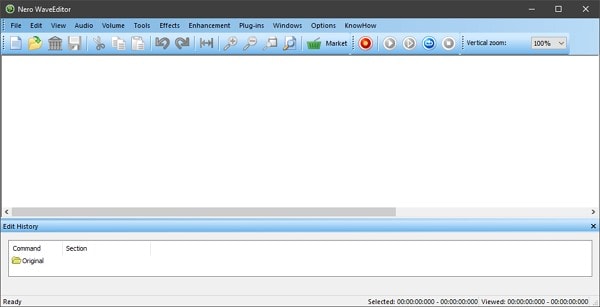
Nero WaveEditor is available for use in multiple languages, including German, Dutch, and French. It has a file size of 170MB. You get multiple audio editing options that provide full user control of the audio that is being edited.
Part 2. Key Features of Nero WaveEditor
For quick and easy editing and recording of audio files, Nero WaveEditor is a great option. This editor has simple yet very effective tools for manipulating audio files. It is free to use and works perfectly with different audio file formats. Some other key features of Nero WaveEditor are discussed below:
· View Options
No other audio editor offers this many view options as you get from Nero WaveEditor. From the top toolbar, you have to access the ‘View’ tab, where you will find different options. For instance, you’ll have access to the Wave display, Spectrogram display, and also Wavelet display.
· Tools
Do you have any idea about the different tools Nero WaveEditor offers? This editor has some very powerful editing tools, like Stereo Processor, Noise Gate, Equalizer, Pitch Tuning, and so much more. Access the ‘Tools’ tab to use these tools.
· Editing Options
Nero WaveEditor not only offers advanced editing tools but also provides some general editing options. For instance, you can Cut, Delete, Crop, Copy, etc. Options like Convert Sample Format, Reverse, and Insert Track Split are also offered.
· Enhancement Features
Is editing enough to enhance your audio? Try Enhancement features from Nero WaveEditor to completely transform your audio file. You get options like Noise Analysis, Noise Reduction, etc.
Part 3. Pros and Cons of Nero WaveEditor
Nero WaveEditor has some impressive features that instantly attract users. This editor is great for quick audio editing. To learn more about it, read the following section as we are about to share the benefits and drawbacks of Nero WaveEditor.
Benefits
- No matter where you belong, Nero WaveEditoris still usable as it supports different languages like Danish, Greek, Czech, Spanish, Russian, and others.
- A great thing about this wave editor is its support for plugins. For example, Nero supports VST and DirectX.
- Nero WaveEditor is not just an audio editor; it’s also an audio recorder. You can either import media files from your device or else record them on the spot.
- What else is great about Nero WaveEditor? This editor provides non-destructive editing. Nero offers full Preview and Undo features.
Drawbacks
- The main drawback of Nero WaveEditoris its interface. The offered interface is very outdated. The design and UI are not updated according to the latest Windows version.
Part 4. How to Use Nero WaveEditor?
Have you ever used Nero WaveEditor before? Or heard about it? If none is your case, this section will provide great help to you. We are about to share Nero WaveEditor’s step-by-step guideline with you for better working and understanding. Let’s begin!
Step 1: After installing the editor, launch it. Head to the ‘File’ tab and select the ‘Open’ option to import audio files from your respective device. Or else, you can also select the option to ‘Record’ from the toolbar.
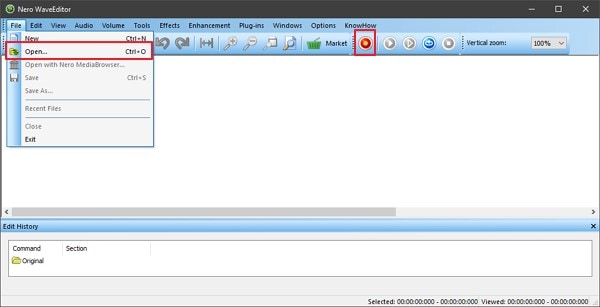
Step 2: Start editing by firstly moving to the ‘Edit’ tab. There, you will find different editing options like; Cut, Crop, Copy, Delete, Reverse, and others.
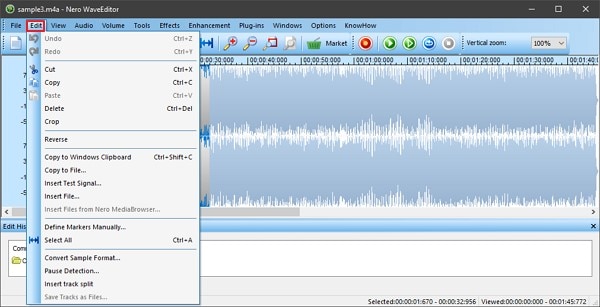
Step 3: In case you are interested in using the Fade In and Fade Out features, head to the ‘Volume’ section. Not just this, you also get other options, for instance, Normalize, Volume change, and Mute.
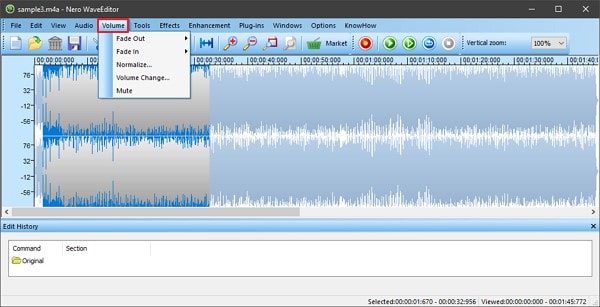
Step 4: Who doesn’t add effects while editing? Try the amazing effects offered by Nero WaveEditor from the ‘Effects’ tab. You can select from the provided options like Distortion, Loudness, Reverb, Delay, and others.
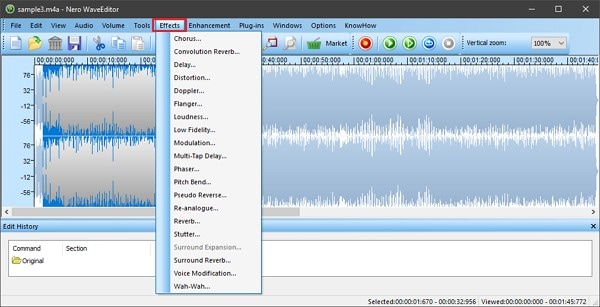
Step 5: For enhancing your audio file, head to the ‘Enhancements’ section to use the offered options. For example, get your hands-on features like Noise Reduction, Noise Analysis, etc.
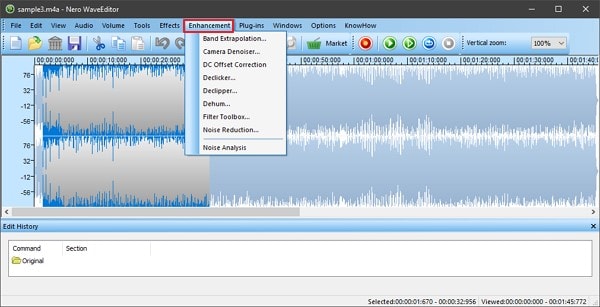
Step 6: Once everything is done, save the edited audio file to your device. For this, move to the ‘File’ tab and select the ‘Save As’ an option to save the file in your desired file format.
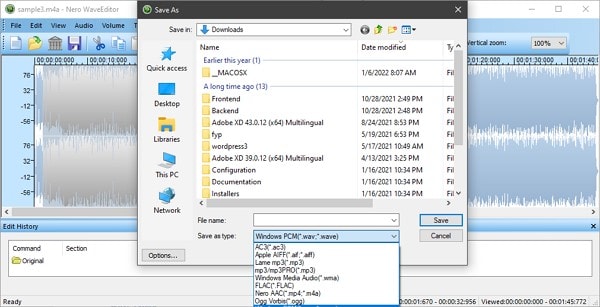
Part 5. Alternatives for Nero WaveEditor
People might not be able to use Nero WaveEditor as beginners. You can use other software to learn audio editing. We are suggesting two alternative editors to Nero WaveEditor so that you can use the following discussed alternatively for editing purposes.
Wave Editor
Wave Editor is a fast and easy-to-use editing software that is a great alternative for Nero WaveEditor download. This editor is powerful and best for those who are trying to learn audio editing. Wave Editor allows a maximum file size of 2GB. It has a simple user interface that boosts your speed and accuracy while using the editor.
What is its compatibility? Wave Editor is compatible with Windows. Moreover, it allows the user to use multiple audio formats, including MP3, WAV, and WMA, along with many more. Wave Editor can do basic editing along with amplifying audios to their maximum limit.
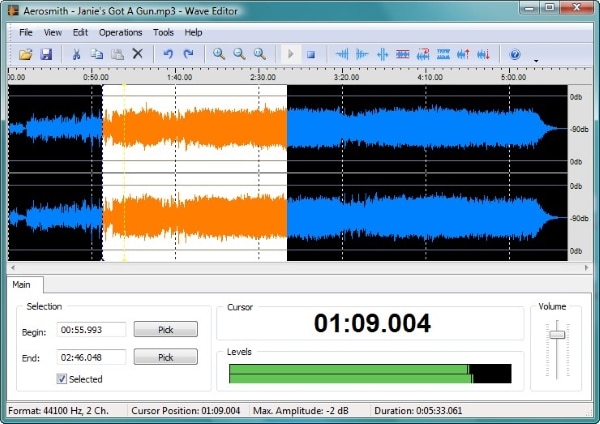
Audacity
Audacity is recording software along with audio editing software. It can do basic editing like cut, copy, paste, and delete, along with merging different audios. What else is great about Audacity? You can use the editor entirely through the keyboard with a large number of shortcuts. Audacity is widely used as exchange software against Nero WaveEditor.
Audacity supports plug-ins; you can either modify plug-ins or even write your own plug-ins. Audacity is free and open-source software with easy editing and multi-track audio editing. What about its compatibility? Audacity is compatible with Windows, Mac, and also Linux.
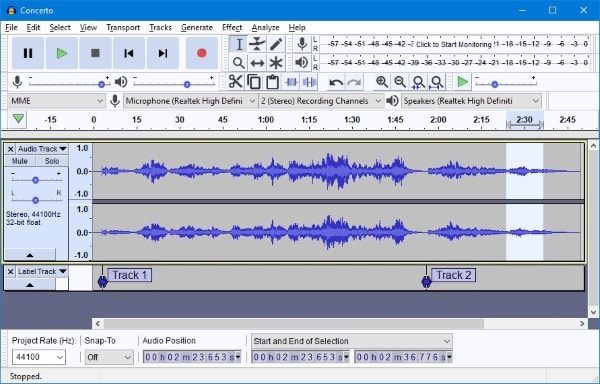
Final Thoughts
Nero WaveEditor is a free editor and very easy to use. For speedy editing, this is an ideal tool. This article talked about its features, advantages and we also shared a step-by-step guideline for your help. Moving on, are you interested in learning about another audio editor? We are talking about Wondershare Filmora Audio Editor , a platform with endless options.
This editing software is easily downloaded, and you don’t need any technical skills to use it. Its simple yet intuitive interface provides various tabs like Effects, Elements, etc. You can get different sound effects from Filmora. Furthermore, some of its advanced audio editing tools are Audio Equalizer, Audio Ducking, Add Voiceovers, Detach Audio from Video, and so many other options.
Wondershare Filmora
Get started easily with Filmora’s powerful performance, intuitive interface, and countless effects!
Try It Free Try It Free Try It Free Learn More >

02 Key Features of Nero WaveEditor
03 Pros and Cons of Nero WaveEditor
04 How to Use Nero WaveEditor?
05 Alternatives for Nero WaveEditor
Part 1. Introduction about Nero WaveEditor
Nero WaveEditor is a simple and powerful editor that anyone can use. It can edit pre-recorded audios along with recording new audios. Nero WaveEditor is capable of editing all major audio editing formats. You can use it to apply filters and optimize sounds. It can also apply effects and save the file. The on-set saving option makes it non-destructive and can be edited freely without making detrimental changes.

Nero WaveEditor is available for use in multiple languages, including German, Dutch, and French. It has a file size of 170MB. You get multiple audio editing options that provide full user control of the audio that is being edited.
Part 2. Key Features of Nero WaveEditor
For quick and easy editing and recording of audio files, Nero WaveEditor is a great option. This editor has simple yet very effective tools for manipulating audio files. It is free to use and works perfectly with different audio file formats. Some other key features of Nero WaveEditor are discussed below:
· View Options
No other audio editor offers this many view options as you get from Nero WaveEditor. From the top toolbar, you have to access the ‘View’ tab, where you will find different options. For instance, you’ll have access to the Wave display, Spectrogram display, and also Wavelet display.
· Tools
Do you have any idea about the different tools Nero WaveEditor offers? This editor has some very powerful editing tools, like Stereo Processor, Noise Gate, Equalizer, Pitch Tuning, and so much more. Access the ‘Tools’ tab to use these tools.
· Editing Options
Nero WaveEditor not only offers advanced editing tools but also provides some general editing options. For instance, you can Cut, Delete, Crop, Copy, etc. Options like Convert Sample Format, Reverse, and Insert Track Split are also offered.
· Enhancement Features
Is editing enough to enhance your audio? Try Enhancement features from Nero WaveEditor to completely transform your audio file. You get options like Noise Analysis, Noise Reduction, etc.
Part 3. Pros and Cons of Nero WaveEditor
Nero WaveEditor has some impressive features that instantly attract users. This editor is great for quick audio editing. To learn more about it, read the following section as we are about to share the benefits and drawbacks of Nero WaveEditor.
Benefits
- No matter where you belong, Nero WaveEditoris still usable as it supports different languages like Danish, Greek, Czech, Spanish, Russian, and others.
- A great thing about this wave editor is its support for plugins. For example, Nero supports VST and DirectX.
- Nero WaveEditor is not just an audio editor; it’s also an audio recorder. You can either import media files from your device or else record them on the spot.
- What else is great about Nero WaveEditor? This editor provides non-destructive editing. Nero offers full Preview and Undo features.
Drawbacks
- The main drawback of Nero WaveEditoris its interface. The offered interface is very outdated. The design and UI are not updated according to the latest Windows version.
Part 4. How to Use Nero WaveEditor?
Have you ever used Nero WaveEditor before? Or heard about it? If none is your case, this section will provide great help to you. We are about to share Nero WaveEditor’s step-by-step guideline with you for better working and understanding. Let’s begin!
Step 1: After installing the editor, launch it. Head to the ‘File’ tab and select the ‘Open’ option to import audio files from your respective device. Or else, you can also select the option to ‘Record’ from the toolbar.

Step 2: Start editing by firstly moving to the ‘Edit’ tab. There, you will find different editing options like; Cut, Crop, Copy, Delete, Reverse, and others.

Step 3: In case you are interested in using the Fade In and Fade Out features, head to the ‘Volume’ section. Not just this, you also get other options, for instance, Normalize, Volume change, and Mute.

Step 4: Who doesn’t add effects while editing? Try the amazing effects offered by Nero WaveEditor from the ‘Effects’ tab. You can select from the provided options like Distortion, Loudness, Reverb, Delay, and others.

Step 5: For enhancing your audio file, head to the ‘Enhancements’ section to use the offered options. For example, get your hands-on features like Noise Reduction, Noise Analysis, etc.

Step 6: Once everything is done, save the edited audio file to your device. For this, move to the ‘File’ tab and select the ‘Save As’ an option to save the file in your desired file format.

Part 5. Alternatives for Nero WaveEditor
People might not be able to use Nero WaveEditor as beginners. You can use other software to learn audio editing. We are suggesting two alternative editors to Nero WaveEditor so that you can use the following discussed alternatively for editing purposes.
Wave Editor
Wave Editor is a fast and easy-to-use editing software that is a great alternative for Nero WaveEditor download. This editor is powerful and best for those who are trying to learn audio editing. Wave Editor allows a maximum file size of 2GB. It has a simple user interface that boosts your speed and accuracy while using the editor.
What is its compatibility? Wave Editor is compatible with Windows. Moreover, it allows the user to use multiple audio formats, including MP3, WAV, and WMA, along with many more. Wave Editor can do basic editing along with amplifying audios to their maximum limit.

Audacity
Audacity is recording software along with audio editing software. It can do basic editing like cut, copy, paste, and delete, along with merging different audios. What else is great about Audacity? You can use the editor entirely through the keyboard with a large number of shortcuts. Audacity is widely used as exchange software against Nero WaveEditor.
Audacity supports plug-ins; you can either modify plug-ins or even write your own plug-ins. Audacity is free and open-source software with easy editing and multi-track audio editing. What about its compatibility? Audacity is compatible with Windows, Mac, and also Linux.

Final Thoughts
Nero WaveEditor is a free editor and very easy to use. For speedy editing, this is an ideal tool. This article talked about its features, advantages and we also shared a step-by-step guideline for your help. Moving on, are you interested in learning about another audio editor? We are talking about Wondershare Filmora Audio Editor , a platform with endless options.
This editing software is easily downloaded, and you don’t need any technical skills to use it. Its simple yet intuitive interface provides various tabs like Effects, Elements, etc. You can get different sound effects from Filmora. Furthermore, some of its advanced audio editing tools are Audio Equalizer, Audio Ducking, Add Voiceovers, Detach Audio from Video, and so many other options.
Wondershare Filmora
Get started easily with Filmora’s powerful performance, intuitive interface, and countless effects!
Try It Free Try It Free Try It Free Learn More >

02 Key Features of Nero WaveEditor
03 Pros and Cons of Nero WaveEditor
04 How to Use Nero WaveEditor?
05 Alternatives for Nero WaveEditor
Part 1. Introduction about Nero WaveEditor
Nero WaveEditor is a simple and powerful editor that anyone can use. It can edit pre-recorded audios along with recording new audios. Nero WaveEditor is capable of editing all major audio editing formats. You can use it to apply filters and optimize sounds. It can also apply effects and save the file. The on-set saving option makes it non-destructive and can be edited freely without making detrimental changes.

Nero WaveEditor is available for use in multiple languages, including German, Dutch, and French. It has a file size of 170MB. You get multiple audio editing options that provide full user control of the audio that is being edited.
Part 2. Key Features of Nero WaveEditor
For quick and easy editing and recording of audio files, Nero WaveEditor is a great option. This editor has simple yet very effective tools for manipulating audio files. It is free to use and works perfectly with different audio file formats. Some other key features of Nero WaveEditor are discussed below:
· View Options
No other audio editor offers this many view options as you get from Nero WaveEditor. From the top toolbar, you have to access the ‘View’ tab, where you will find different options. For instance, you’ll have access to the Wave display, Spectrogram display, and also Wavelet display.
· Tools
Do you have any idea about the different tools Nero WaveEditor offers? This editor has some very powerful editing tools, like Stereo Processor, Noise Gate, Equalizer, Pitch Tuning, and so much more. Access the ‘Tools’ tab to use these tools.
· Editing Options
Nero WaveEditor not only offers advanced editing tools but also provides some general editing options. For instance, you can Cut, Delete, Crop, Copy, etc. Options like Convert Sample Format, Reverse, and Insert Track Split are also offered.
· Enhancement Features
Is editing enough to enhance your audio? Try Enhancement features from Nero WaveEditor to completely transform your audio file. You get options like Noise Analysis, Noise Reduction, etc.
Part 3. Pros and Cons of Nero WaveEditor
Nero WaveEditor has some impressive features that instantly attract users. This editor is great for quick audio editing. To learn more about it, read the following section as we are about to share the benefits and drawbacks of Nero WaveEditor.
Benefits
- No matter where you belong, Nero WaveEditoris still usable as it supports different languages like Danish, Greek, Czech, Spanish, Russian, and others.
- A great thing about this wave editor is its support for plugins. For example, Nero supports VST and DirectX.
- Nero WaveEditor is not just an audio editor; it’s also an audio recorder. You can either import media files from your device or else record them on the spot.
- What else is great about Nero WaveEditor? This editor provides non-destructive editing. Nero offers full Preview and Undo features.
Drawbacks
- The main drawback of Nero WaveEditoris its interface. The offered interface is very outdated. The design and UI are not updated according to the latest Windows version.
Part 4. How to Use Nero WaveEditor?
Have you ever used Nero WaveEditor before? Or heard about it? If none is your case, this section will provide great help to you. We are about to share Nero WaveEditor’s step-by-step guideline with you for better working and understanding. Let’s begin!
Step 1: After installing the editor, launch it. Head to the ‘File’ tab and select the ‘Open’ option to import audio files from your respective device. Or else, you can also select the option to ‘Record’ from the toolbar.

Step 2: Start editing by firstly moving to the ‘Edit’ tab. There, you will find different editing options like; Cut, Crop, Copy, Delete, Reverse, and others.

Step 3: In case you are interested in using the Fade In and Fade Out features, head to the ‘Volume’ section. Not just this, you also get other options, for instance, Normalize, Volume change, and Mute.

Step 4: Who doesn’t add effects while editing? Try the amazing effects offered by Nero WaveEditor from the ‘Effects’ tab. You can select from the provided options like Distortion, Loudness, Reverb, Delay, and others.

Step 5: For enhancing your audio file, head to the ‘Enhancements’ section to use the offered options. For example, get your hands-on features like Noise Reduction, Noise Analysis, etc.

Step 6: Once everything is done, save the edited audio file to your device. For this, move to the ‘File’ tab and select the ‘Save As’ an option to save the file in your desired file format.

Part 5. Alternatives for Nero WaveEditor
People might not be able to use Nero WaveEditor as beginners. You can use other software to learn audio editing. We are suggesting two alternative editors to Nero WaveEditor so that you can use the following discussed alternatively for editing purposes.
Wave Editor
Wave Editor is a fast and easy-to-use editing software that is a great alternative for Nero WaveEditor download. This editor is powerful and best for those who are trying to learn audio editing. Wave Editor allows a maximum file size of 2GB. It has a simple user interface that boosts your speed and accuracy while using the editor.
What is its compatibility? Wave Editor is compatible with Windows. Moreover, it allows the user to use multiple audio formats, including MP3, WAV, and WMA, along with many more. Wave Editor can do basic editing along with amplifying audios to their maximum limit.

Audacity
Audacity is recording software along with audio editing software. It can do basic editing like cut, copy, paste, and delete, along with merging different audios. What else is great about Audacity? You can use the editor entirely through the keyboard with a large number of shortcuts. Audacity is widely used as exchange software against Nero WaveEditor.
Audacity supports plug-ins; you can either modify plug-ins or even write your own plug-ins. Audacity is free and open-source software with easy editing and multi-track audio editing. What about its compatibility? Audacity is compatible with Windows, Mac, and also Linux.

Final Thoughts
Nero WaveEditor is a free editor and very easy to use. For speedy editing, this is an ideal tool. This article talked about its features, advantages and we also shared a step-by-step guideline for your help. Moving on, are you interested in learning about another audio editor? We are talking about Wondershare Filmora Audio Editor , a platform with endless options.
This editing software is easily downloaded, and you don’t need any technical skills to use it. Its simple yet intuitive interface provides various tabs like Effects, Elements, etc. You can get different sound effects from Filmora. Furthermore, some of its advanced audio editing tools are Audio Equalizer, Audio Ducking, Add Voiceovers, Detach Audio from Video, and so many other options.
Wondershare Filmora
Get started easily with Filmora’s powerful performance, intuitive interface, and countless effects!
Try It Free Try It Free Try It Free Learn More >

02 Key Features of Nero WaveEditor
03 Pros and Cons of Nero WaveEditor
04 How to Use Nero WaveEditor?
05 Alternatives for Nero WaveEditor
Part 1. Introduction about Nero WaveEditor
Nero WaveEditor is a simple and powerful editor that anyone can use. It can edit pre-recorded audios along with recording new audios. Nero WaveEditor is capable of editing all major audio editing formats. You can use it to apply filters and optimize sounds. It can also apply effects and save the file. The on-set saving option makes it non-destructive and can be edited freely without making detrimental changes.

Nero WaveEditor is available for use in multiple languages, including German, Dutch, and French. It has a file size of 170MB. You get multiple audio editing options that provide full user control of the audio that is being edited.
Part 2. Key Features of Nero WaveEditor
For quick and easy editing and recording of audio files, Nero WaveEditor is a great option. This editor has simple yet very effective tools for manipulating audio files. It is free to use and works perfectly with different audio file formats. Some other key features of Nero WaveEditor are discussed below:
· View Options
No other audio editor offers this many view options as you get from Nero WaveEditor. From the top toolbar, you have to access the ‘View’ tab, where you will find different options. For instance, you’ll have access to the Wave display, Spectrogram display, and also Wavelet display.
· Tools
Do you have any idea about the different tools Nero WaveEditor offers? This editor has some very powerful editing tools, like Stereo Processor, Noise Gate, Equalizer, Pitch Tuning, and so much more. Access the ‘Tools’ tab to use these tools.
· Editing Options
Nero WaveEditor not only offers advanced editing tools but also provides some general editing options. For instance, you can Cut, Delete, Crop, Copy, etc. Options like Convert Sample Format, Reverse, and Insert Track Split are also offered.
· Enhancement Features
Is editing enough to enhance your audio? Try Enhancement features from Nero WaveEditor to completely transform your audio file. You get options like Noise Analysis, Noise Reduction, etc.
Part 3. Pros and Cons of Nero WaveEditor
Nero WaveEditor has some impressive features that instantly attract users. This editor is great for quick audio editing. To learn more about it, read the following section as we are about to share the benefits and drawbacks of Nero WaveEditor.
Benefits
- No matter where you belong, Nero WaveEditoris still usable as it supports different languages like Danish, Greek, Czech, Spanish, Russian, and others.
- A great thing about this wave editor is its support for plugins. For example, Nero supports VST and DirectX.
- Nero WaveEditor is not just an audio editor; it’s also an audio recorder. You can either import media files from your device or else record them on the spot.
- What else is great about Nero WaveEditor? This editor provides non-destructive editing. Nero offers full Preview and Undo features.
Drawbacks
- The main drawback of Nero WaveEditoris its interface. The offered interface is very outdated. The design and UI are not updated according to the latest Windows version.
Part 4. How to Use Nero WaveEditor?
Have you ever used Nero WaveEditor before? Or heard about it? If none is your case, this section will provide great help to you. We are about to share Nero WaveEditor’s step-by-step guideline with you for better working and understanding. Let’s begin!
Step 1: After installing the editor, launch it. Head to the ‘File’ tab and select the ‘Open’ option to import audio files from your respective device. Or else, you can also select the option to ‘Record’ from the toolbar.

Step 2: Start editing by firstly moving to the ‘Edit’ tab. There, you will find different editing options like; Cut, Crop, Copy, Delete, Reverse, and others.

Step 3: In case you are interested in using the Fade In and Fade Out features, head to the ‘Volume’ section. Not just this, you also get other options, for instance, Normalize, Volume change, and Mute.

Step 4: Who doesn’t add effects while editing? Try the amazing effects offered by Nero WaveEditor from the ‘Effects’ tab. You can select from the provided options like Distortion, Loudness, Reverb, Delay, and others.

Step 5: For enhancing your audio file, head to the ‘Enhancements’ section to use the offered options. For example, get your hands-on features like Noise Reduction, Noise Analysis, etc.

Step 6: Once everything is done, save the edited audio file to your device. For this, move to the ‘File’ tab and select the ‘Save As’ an option to save the file in your desired file format.

Part 5. Alternatives for Nero WaveEditor
People might not be able to use Nero WaveEditor as beginners. You can use other software to learn audio editing. We are suggesting two alternative editors to Nero WaveEditor so that you can use the following discussed alternatively for editing purposes.
Wave Editor
Wave Editor is a fast and easy-to-use editing software that is a great alternative for Nero WaveEditor download. This editor is powerful and best for those who are trying to learn audio editing. Wave Editor allows a maximum file size of 2GB. It has a simple user interface that boosts your speed and accuracy while using the editor.
What is its compatibility? Wave Editor is compatible with Windows. Moreover, it allows the user to use multiple audio formats, including MP3, WAV, and WMA, along with many more. Wave Editor can do basic editing along with amplifying audios to their maximum limit.

Audacity
Audacity is recording software along with audio editing software. It can do basic editing like cut, copy, paste, and delete, along with merging different audios. What else is great about Audacity? You can use the editor entirely through the keyboard with a large number of shortcuts. Audacity is widely used as exchange software against Nero WaveEditor.
Audacity supports plug-ins; you can either modify plug-ins or even write your own plug-ins. Audacity is free and open-source software with easy editing and multi-track audio editing. What about its compatibility? Audacity is compatible with Windows, Mac, and also Linux.

Final Thoughts
Nero WaveEditor is a free editor and very easy to use. For speedy editing, this is an ideal tool. This article talked about its features, advantages and we also shared a step-by-step guideline for your help. Moving on, are you interested in learning about another audio editor? We are talking about Wondershare Filmora Audio Editor , a platform with endless options.
This editing software is easily downloaded, and you don’t need any technical skills to use it. Its simple yet intuitive interface provides various tabs like Effects, Elements, etc. You can get different sound effects from Filmora. Furthermore, some of its advanced audio editing tools are Audio Equalizer, Audio Ducking, Add Voiceovers, Detach Audio from Video, and so many other options.
Wondershare Filmora
Get started easily with Filmora’s powerful performance, intuitive interface, and countless effects!
Try It Free Try It Free Try It Free Learn More >

Also read:
- Updated In 2024, The Ultimate Playlist Composing Music for Visuals in the Modern Era
- New Melody and Mics The 10 Most User-Friendly Voice Capture Tools in Technology
- Updated In 2024, Top Strategies for Transforming Podcast Audio Into MP3 Format
- Elevating Your Vocal Range Deepening Tones with Filmoras Tools for 2024
- Updated 2024 Approved Audio Edits Unleashed Navigating the Tools of Avidemux for Professional Results
- Updated In 2024, Inside Americas Favorite Non-Omegle Video Chat Websites A Current Ranking Guide
- New Top 3 Best MP3 Volume Boosters Online
- Updated 2024 Approved The Ultimate Guide to Fusing High-Fidelity Audio Into MP4 Filmmaking
- Nine Spectacular Platforms for Accessing Copyright-Free Funny Audio for 2024
- Updated In 2024, The Kaleidoscope of Game Audio Spotting the Buttons Sonic Impressions
- Top-Rated FREE Online Libraries for Guitarists High-Quality Melodies & Visuals
- Updated 2024 Approved Refinement of Music Files on Mac A Look at the Most Acclaimed MP3 Editors
- New 2024 Approved Discover New Tunes Curated DJ Hits
- Updated The Definitive Guide to Android and iOS Voice Amplifiers During Calls for 2024
- 2024 Approved Cutting Edge Free Vocal Modifications Made Simple In-Depth Tutorials on Audio Editing with Filmora
- In 2024, How to Record on GarageBand? Step by Step Guide
- Taming the Audible Ambiance Step-by-Step Techniques for Eradicating Hidden Harmonies
- Beyond Apowersoft A Detailed Overview and Selection Guide for Digital Audio Recorders
- Audiovisual Separation Expertise Removing Voices to Highlight Song Written Words for 2024
- Updated 2024 Approved Proven Leaders in Speech to Text The Best 6 Automatic Transcription Apps
- Updated Supercharge Visual & Aural Aspects of Media Content for 2024
- New In 2024, Curated List of 10 Online Havens for High-Quality Montage Audio Collections
- New 2024 Approved Ringtone Manipulation From Default Sounds to Custom Beat Selections
- Updated 2024 Approved Audacity Tutorial Boost or Mute Your Sound Effectively
- Soundwave Shift Step-by-Step MP3 to MP4 Audio File Transformation
- How to Upgrade Apple iPhone 7 Plus without Losing Data? | Dr.fone
- Hacks to do pokemon go trainer battles For Google Pixel Fold | Dr.fone
- 3 Ways to Change Location on Facebook Marketplace for Apple iPhone 12 | Dr.fone
- Updated 2024 Approved Online Video Editors Free and Paid Options with Music Support
- New Top Video Editing Software with Audio Tracks for 2024
- In 2024, How to Change Google Play Location On Realme Narzo 60 5G | Dr.fone
- 2024 Approved Top iPhone and iPad Video Montage Makers
- 2024 Approved Top-Rated Free Online Invitation Video Editing Software
- New WeVideo Where Video Creation Meets Simplicity for 2024
- How to Downgrade iPhone XS without iTunes? | Dr.fone
- New Say Goodbye to Premiere Rush Top 4 Alternative Video Editors for 2024
- Title: New Vital Details About Accessing YouTubes Sound Library
- Author: Jacob
- Created at : 2024-05-05 03:43:14
- Updated at : 2024-05-06 03:43:14
- Link: https://audio-shaping.techidaily.com/new-vital-details-about-accessing-youtubes-sound-library/
- License: This work is licensed under CC BY-NC-SA 4.0.



